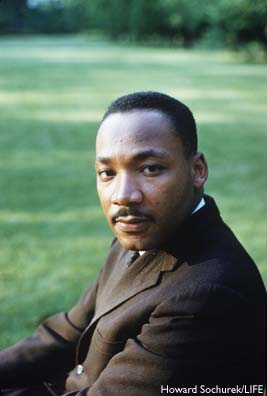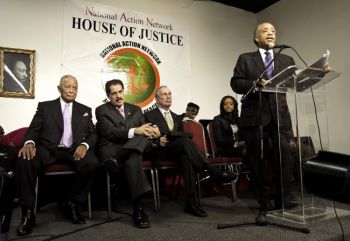NEW YORK—The Rev. Al Sharpton, president of the civil rights advocacy organization National Action Network (NAN), invited the city’s key politicians to reflect on Martin Luther King Jr.’s philosophy of nonviolence at the NAN headquarters in Harlem on Monday. King’s message of nonviolence resonated with the recent shooting in Arizona.

“King was a critic of gun violence, and a victim of it,” said Congressman Jerrold Nadler (D-N.Y.).
King’s home was bombed twice over his years of vocal activism, and he received threats almost daily. He fell victim to an assassin’s bullet at the age of 39 while standing on his motel balcony in Memphis, Tenn.
"As my sufferings mounted I soon realized that there were two ways in which I could respond to my situation—either to react with bitterness or seek to transform the suffering into a creative force. I decided to follow the latter course," Mayor Michael Bloomberg quoted King, noting his resilience through the violence perpetrated against him.
King’s eloquent words and his inspiring actions were a thread running through politicians’ speeches. Hundreds of people packed the House of Justice on West 145th Street. The predominantly African-American crowd spilled out onto the street, where they could still hear the speeches from a loudspeaker.
Bloomberg was met by a mixed reaction—“boos” mingled with subdued clapping. The mayor was introduced by the Rev. Sharpton, who lauded his appearance at the House of Justice, as the two have not always seen eye-to-eye in the past. Sharpton reflected that King worked closely with his adversaries, recognizing that cooperation is the only way to effect change.


“King was a critic of gun violence, and a victim of it,” said Congressman Jerrold Nadler (D-N.Y.).
King’s home was bombed twice over his years of vocal activism, and he received threats almost daily. He fell victim to an assassin’s bullet at the age of 39 while standing on his motel balcony in Memphis, Tenn.
"As my sufferings mounted I soon realized that there were two ways in which I could respond to my situation—either to react with bitterness or seek to transform the suffering into a creative force. I decided to follow the latter course," Mayor Michael Bloomberg quoted King, noting his resilience through the violence perpetrated against him.
King’s eloquent words and his inspiring actions were a thread running through politicians’ speeches. Hundreds of people packed the House of Justice on West 145th Street. The predominantly African-American crowd spilled out onto the street, where they could still hear the speeches from a loudspeaker.
Bloomberg was met by a mixed reaction—“boos” mingled with subdued clapping. The mayor was introduced by the Rev. Sharpton, who lauded his appearance at the House of Justice, as the two have not always seen eye-to-eye in the past. Sharpton reflected that King worked closely with his adversaries, recognizing that cooperation is the only way to effect change.



